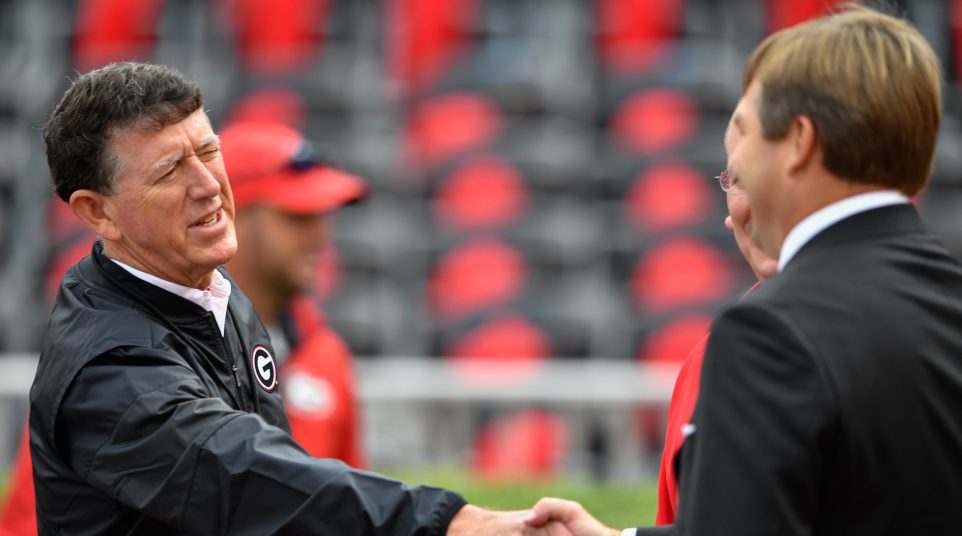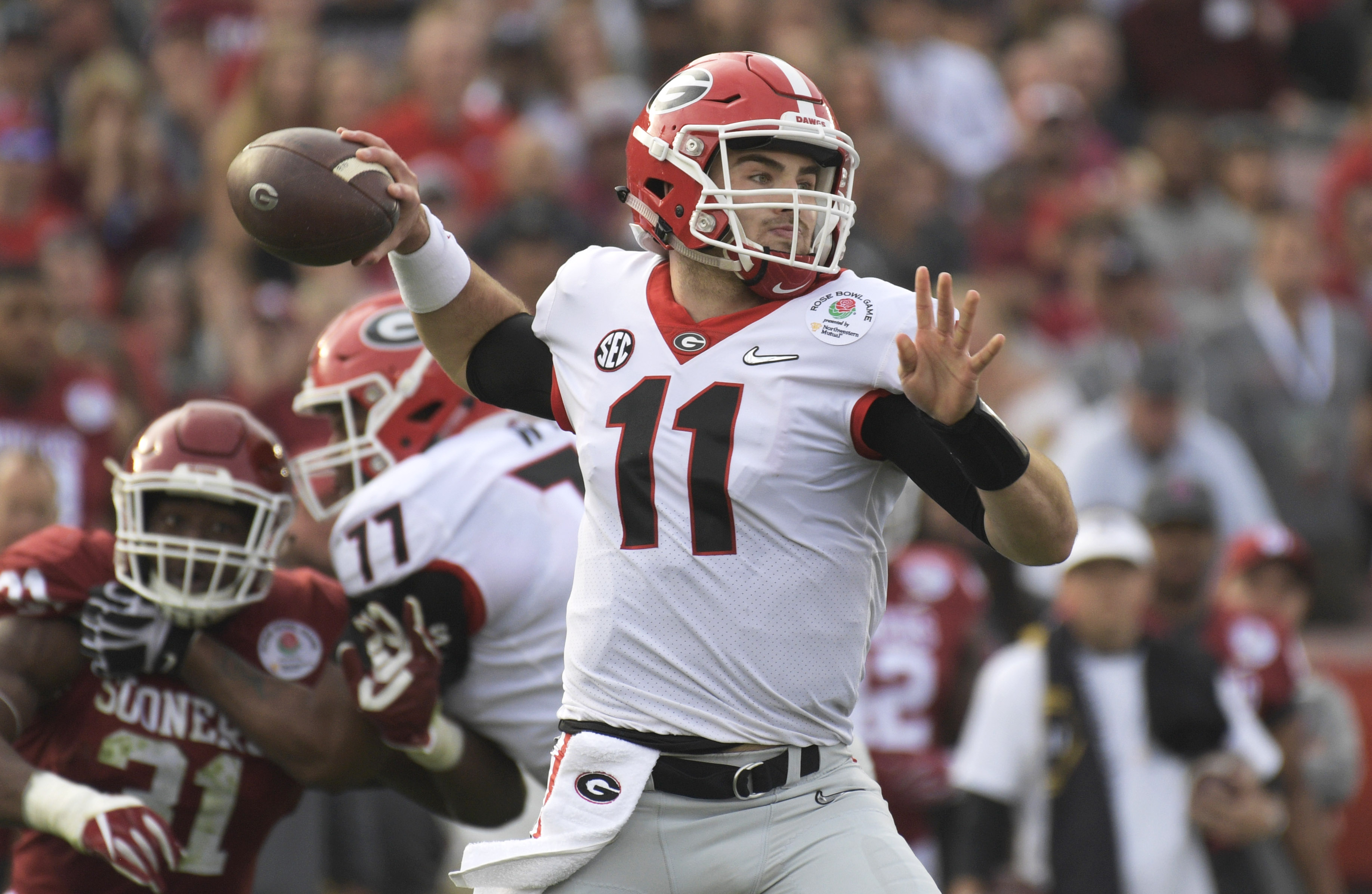
The Dawgs' return to glory started with a Smart gamble. Now they must finish.
“Who’s that coming down the tracks,
Mean Machine in red and black…”
It was late November 2015 and Greg McGarity, Georgia’s athletic director, knew he was taking a risk.
But as he watched the Bulldogs struggle to beat Georgia Southern and then skate by rival Georgia Tech 13-7 to cap another nine-win regular season under longtime head coach Mark Richt, he felt this tugging in his stomach, a quiet jabbing in his gut that Georgia could do better.
Richt was 145-51 in Athens and had won multiple SEC titles, produced multiple 10-win seasons and had taken the Dawgs to a handful of BCS bowl games. He was the first Georgia coach to achieve sustained success since the retirement of the iconic Vince Dooley and, at the time, the dean of SEC football coaches. What’s more, Richt was revered in the community as a molder of men, a devoutly religious man who had consistently honored the university and Georgia brand.
But Richt hadn’t won the SEC since 2005, and with only one exception (2007) his best teams (2003, 2004, 2008) lost Cocktail Party games to archrival Florida that kept them just outside of national championship contention. His 2007 team faltered against hated Steve Spurrier’s South Carolina (which finished 6-6 and didn’t make a bowl game that year) and against Tennessee, depriving Georgia of another shot at national glory.
Still, Georgia won, and won a lot, averaging 9.7 wins a year under the Richt regime. In most places, they’d build a statute of a coach like Richt outside the stadium. But Georgia, an idyllic southern college town situated as the flagship university in one of America’s hottest recruiting beds, isn’t an ordinary place. In the state of Georgia, college football is king and Athens, where the ghost of Herschel Walker glides through the air to the raspy tones of Larry Munson, is the center of the universe.
And McGarity, himself a Georgia alum, couldn’t shake the feeling that Georgia football could be more.
McGarity had apprenticed under legendary Florida athletic director Jeremy Foley, and when McGarity left Florida, where he was executive assistant athletic director, to take the AD job at his alma mater, Foley imparted and elevated one message to his former deputy above all others.
“Why not do immediately what will or must be done eventually?” Foley said.
For Georgia to be great, not just really good, McGarity decided Richt needed to go, and immediately, not eventually.
So, he gambled. McGarity met with administration brass and the decision was made to part ways with Richt.
McGarity knew who he wanted to replace Richt, but time was of the essence. Other high-profile coaching jobs were either already open or coming open, and his choice, Alabama defensive coordinator and Georgia alum Kirby Smart, was at the top of most lists. As the college football world expressed shock and in some corners, dismay, at the firing of a good man who had won consistently, McGarity labored behind the scenes to close the deal on Smart. Smart was signed and introduced a week later.
Smart himself was another gamble.
Questions persisted as to whether Smart was a co-architect of the mighty Nick Saban defenses that had propelled Alabama to four national championships in Saban’s tenure (all with Smart on staff), or simply a custodian and steward, the overseer who simply made sure Saban’s defensive marching orders were carried out.
These weren’t unfair questions.
The idea of hiring a Saban assistant has obvious appeal: he’s the greatest college football coach in the history of the sport and why wouldn’t you want to hire someone who learned under him? The Alabama blueprint works. Why not emulate it?
But it is a gamble.
The Saban coaching tree isn’t a wholesale failure, but the only roaring success story until Smart was former offensive coordinator Jimbo Fisher, who won three ACC championships, made a playoff appearance and captured a national championship, in 2013, at Florida State before departing for Texas A&M this November.
Everywhere else, results range from failed to mixed.
Derek Dooley was a failure of epic proportions at Tennessee, the orange pants, World War II jokes and congenial small-town lawyer manner enough to buy him too much time at a job he was never equipped to handle. Jeremy Pruitt, the current Alabama defensive coordinator, is next up.
Lane Kiffin appears to be ascendant again after a spell as Saban’s offensive coordinator, but at Group of 5 Florida Atlantic, there’s little pressure and Lane’s free to well, be Lane.
Like Smart, former Saban defensive coordinator Will Muschamp had tremendous success at Florida in year two, taking the Gators to within a play of the national championship game. But despite early success and an early top five recruiting class, Muschamp could never get Florida’s offense on track and was fired in year four.
Jim McElwain revitalized a moribund Colorado State program and won two SEC East titles at Florida, largely on the backs of the defense he inherited from Muschamp. But he was fired midway through season three, a combination of bizarre off-field behavior, subpar recruiting and an inability to right Florida’s offensive ship doing him in shortly after the Gators were annihilated, 42-7, by Smart’s Georgia.
“We just stepped on their face with a hobnail boot and broke their nose…”
The team Smart inherited had won 10 games, but there were obvious flaws.
The largest was a lack of toughness and physicality, and from day one, Smart set out to make it better.
Thanks to his time with Saban, Smart had a blueprint as to how to build a championship program, and he had the longest time of any of Saban’s assistants in the lab, so to speak.
But perhaps as important, as a former defensive back who had played at Georgia in the underachieving 1990s under two coaches, Ray Goff and Jim Donnan, Smart had seen Georgia coaches who hadn’t been able to get it right. He had a blueprint for what not to do at Georgia, and kept that in the back of his mind too.
Like Saban, Smart hired a strength and conditioning coach he trusted and installed nearly a carbon-copy of the Alabama offseason strength program. Smart also immediately let it be known that his hands would be on all contours of the program, from the obviously vital hiring of assistants and support staff to at least signing off on the quotidian, from the offseason nutrition plans to pregame meals and hotel locations. Nothing was or is beneath the head football coach.
The results weren’t immediate.
Despite the return of Nick Chubb from a serious knee injury, Georgia won only seven games in the regular season in Smart’s first season, and continued to struggle mightily against physical, strong and fast defensive fronts. They were manhandled by Florida and lost 24-10, and sucker-punched in Athens by Georgia Tech.
But the team took the Liberty Bowl seriously, beat a young, talented and well-coached TCU, and — after an offseason and spring one Georgia player told me was “the most rugged five months of my life” — Georgia has been a different program.
The offseason workouts and attention to detail have built a tenacious, physical football team, one that has won all but one game at the point of attack, and has a 13-1 record to show for it.
The Bulldogs are also relentless, a never-quit group that plays with its head coach’s fire, as anyone who witnessed the Georgia offensive line redeem itself in Atlanta against Auburn to win the SEC Championship, or saw a defensive front embarrassed in the first half throw Oklahoma’s vaunted offensive line around in the second half of the Rose Bowl could attest.
Those changes, above all, are why they’ll play for the program’s first national championship since 1980 on Monday night in Atlanta.
“My God — a freshman”
The other big difference has been Smart’s willingness to make a change at the quarterback position.
Jacob Eason came to Georgia with 5-star fanfare, the sandy-haired golden boy with the rocket arm who would lead Smart’s revolution. But Eason struggled in his freshman campaign, slow to adjust to the speed of college defenses and to pick up offensive coordinator Jim Chaney’s playbook. He often relied on arm strength when simply knowing where his secondary reads were would do.
And there were questions from those inside and outside the program about his commitment level. One Bulldogs insider told me “Eason loved being the starting quarterback at Georgia, but didn’t necessarily want to be.”

Credit: Kirby Lee-USA TODAY Sports
When Eason was injured in the opener against Appalachian State, Smart turned to true freshman Jake Fromm. Fromm was also highly touted, but there were questions about his physical readiness for the SEC and his arm strength. Still, Fromm was a lifelong Georgia fan who was living his dream. He wasn’t going to get outworked.
The Dawgs haven’t looked back.
And while questions have been asked about whether Fromm can truly lead Georgia if the running game is taken away, they shouldn’t be asked anymore, not after his performance in the SEC Championship Game and his leadership in overcoming a 17-point deficit in the Rose Bowl.
Fromm has protected the ball, made the necessary throws, and led with a quiet confidence that makes everyone around him better.
And he’s only a freshman.
“Glory, Glory”
In a couple days, Georgia will play the biggest game the program has played since losing the 1982 national championship game to Penn State, and mighty Alabama is all that stands between Georgia and its first national championship since 1980.
If you look at recruiting rankings — and you should — they’ll tell you Georgia will be back again soon, regardless of what happens Monday night at Mercedes-Benz Stadium. The personnel will only get better and the infrastructure Smart is building is built to last. Thanks to the resources of the university, the enthusiasm of the boosters, and fertile recruiting territory, Georgia has always been a sleeping giant, just waiting for the right leader to carry it to the promised land.
Smart is building a full-fledged, hell-on-wheels bully. And at the age of 42, Smart is 14 years younger than Saban was when he took the job at Alabama. Forget being “Alabama East.” Smart’s reign could be longer, more imperious, more peerless.
But nothing is guaranteed, and with 31 seniors on his roster, Kirby Smart should — and likely will — approach this game with the same sense of urgency that drives, informs and motivates the way he runs his program.
Georgia is a better football team than Alabama.
The Bulldogs are better at the skill positions on offense. They have three transcendental stars (Chubb, Michel, Smith) to Alabama’s one (Fitzpatrick). They are better at linebacker. They are better at wide receiver, and just good enough in the secondary to cover the one Alabama player who can get open downfield. They are better in special teams. They aren’t quite as good up front but won’t be terribly outmatched, either. And they have the better thrower at quarterback should the game turn on which quarterback can make the big throw. And they are playing an hour from home, where the crowd will likely be on their side.
In short, Georgia should win.
In truth, they better. Fate can be cruel. It could take 38 years to get another chance.
